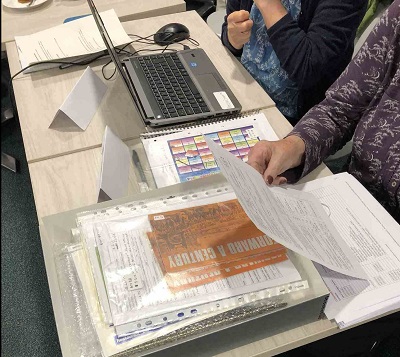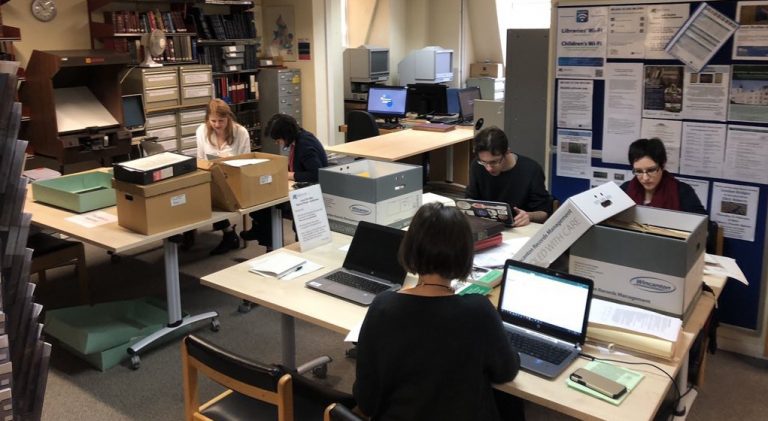This winter we have been keeping busy and out of the cold with some guerrilla cataloguing.
‘Guerrilla cataloguing’, I hear you say. ‘What’s that?’ It is a focused burst of cataloguing activity, designed to produce the maximum amount of catalogue information within a short time frame by recruiting as many cataloguers as possible. The aim is to use available digital tools to boost the visibility of selected online collections at low-to-no cost.
We worked with two different archive services to deliver a guerrilla cataloguing programme designed to help make their collections more accessible. We purposefully chose services with very different capabilities and resources to demonstrate the advantages of Manage Your Collections (MYC), our tool for publishing collections information to Discovery. We wanted to show that no matter where on the spectrum an archive is – whether public or private, small and volunteer-led or staff resourced – MYC offers a user-friendly, sustainable and practical way to manage collections data online.
Clevedon Pier & Heritage Trust
In December last year, we worked with a community archive to deliver a two-day training and guerrilla cataloguing session. The Clevedon Pier & Heritage Trust in North Somerset works to preserve and share the history and heritage of the Victorian seaside town of Clevedon. The Trust launched a community archive project in August 2017 and, having been awarded a Business Archives Council cataloguing grant in the same year, explored the option of using MYC to catalogue and publish collections information online.

Practising cataloguing skills with the Clevedon Pier Archive team
This coincided with the MYC team looking to collaborate with an archive for the first of our guerrilla cataloguing sessions. The stars aligned and we packed our bags for Clevedon, where we spent an enjoyable two days working with the fantastic volunteer archive team, building its confidence with archive cataloguing, as it forged ahead with the project.
The MYC Excel template is ISAD(G) compliant and as the volunteers did not have a background in archives, we needed to design a tailored programme to incorporate training in archive cataloguing. We wanted to make sure, for example, that everyone could differentiate a fonds from a series, and know exactly why it is that archivists create multi-level relational catalogues. For our guerrilla cataloguing session we worked towards creating a structure for their catalogue, and assisted volunteers with first attempts at cataloguing items into the MYC template.
We left with them feeling confident that they could carry on the work and start the not-insignificant task of creating a catalogue for their archive. Six weeks after our visit, with only a brief interlude for Christmas, the volunteers were ready to launch their archive catalogue and put their collections information online for the very first time. Their approach has been to write fonds and series-level descriptions and put these online, with volunteers continuing to work on creating file and item-level descriptions, which will go online in the future.
You can now view the Clevedon Pier and Heritage Trust Archive collection on Discovery.
Richmond Local Studies Library & Archive
We stayed a little closer to home for our next guerrilla cataloguing day, working this time with Richmond Local Studies Library & Archive. They already have some collections information on Discovery from the Access to Archives (A2A) project, and also have a collections management system. They use Spydus, a library CMS that has an optional archives module, with a search interface that covers all of the services collections. However, they lack the resources to undertake extensive cataloguing projects and were interested in expanding access to their collection by using the MYC tool.

Guerrilla cataloguing under way at Richmond Local Studies Library & Archive
We selected for cataloguing the collection of a local historian, Silvia Greenwood, as it’s a frequently-used collection but one that remains uncatalogued. Six of us attended the day, with four of us concentrating on the Greenwood collection, and the other two volunteers focusing on the collection of a local history society.
It was a fun day that felt a bit like Countdown towards the end, as we scrambled to finish and tie-up all the loose ends. We each catalogued a different part of the collection, amalgamating the collection into one template after the event in preparation for upload to Discovery. We also modified the template so that the collection could be ingested into Spydus and be made available in their online catalogue.
You can now view the Silvia Greenwood collection on Discovery.
The guerrilla cataloguing approach – anyone can DIY
With two very different guerrilla cataloguing days completed, we are very happy with the outcomes of each. We developed the model of guerrilla cataloguing to show that it is sustainable and is something archives can do themselves. Of all of us that undertook the guerrilla cataloguing, I was the only qualified archivist for our Clevedon adventure, with two of us qualified for Richmond; the rest were ready and willing volunteers who were happy to embrace the idiosyncrasies of archive cataloguing.
We demonstrated that a focused session and a group of enthusiastic volunteers can achieve a great deal in terms of preparing a collection ready for publication online. This DIY approach can be replicated by any archive and whilst knowledge of the MYC tool will be needed, this is thankfully easier to understand than the finer intricacies of ISAD(G).
Full guidance for Manage Your Collections is available on our website and we are on hand to answer any queries. We would be delighted to hear from any archive interested in using MYC. You can contact the team at manageyourcollections@nationalarchives.gov.uk.
